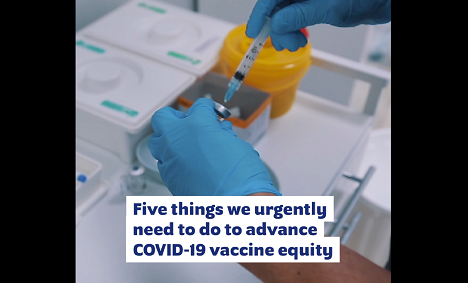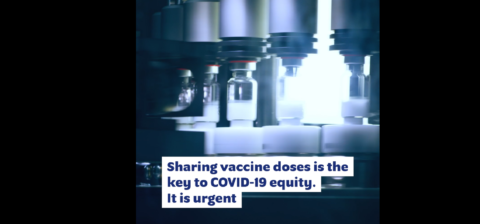21 July 2021 – Today, as stated by Dr Ngozi Okonjo-Iweala, Director General of the World Trade Organization, we are on course to produce 11 billion doses of COVID-19 vaccines by the end of this year, which is sufficient to vaccinate the world’s whole adult population. Now, the issue is how these vaccines are going to be distributed more equitably. This is a problem that has to be addressed in the short term by massive dose sharing.
From the first days of the pandemic, the innovative pharma industry knew that developing and manufacturing COVID-19 vaccines would be a colossal task (Ref: 19 March 2020 – Global Biopharmaceutical Industry Commitment to Address Coronavirus Public Health Crisis included the commitment to increase our manufacturing capabilities and share available capacity to ramp up production once a successful vaccine or treatment is developed).
We are on track to make the impossible happen — ramping manufacturing of Covid-19 vaccines up from zero to 11 billion doses. While three or four of the world’s largest vaccine manufacturers tried to develop COVID-19 vaccines and did not (yet) make it, others did, producing hundreds of million of safe and highly effective vaccines thanks to collaborations that were established early on in the pandemic. Therefore, despite the glitches, the bumps and the disappointments common to vaccine development, we are on track to meet the 11 billion doses target this year.
But much more needs to be done about the equitable distribution of COVID-19 vaccines. This is why, early this year, we reached out to CEPI, COVAX and other partners to convene a Summit on supply chain and manufacturing (Ref: 9 March 2021 – Meeting discusses COVID-19 vaccine manufacturing bottlenecks that must be urgently tackled for C19 vaccine output to reach its full potential). All the experts convened at the Summit agreed that the problems in further expanding manufacturing capacity are the bottlenecks in the supply chains, the trade barriers, shortages of raw materials and other ingredients, as well as skilled labor. Pretty much all experts agree that an IP waiver would not tackle any of these challenges.
Let us focus on what really needs to be done. We have outlined five steps to urgently advance COVID-19 vaccine equity, which we launched in May. These steps include: dose sharing, and rich countries are starting to do that; and optimizing production further, which means building on the massive amount of collaboration and technology transfers already underway. (More than 200 collaborations have been forged since April 2020 [ref: Airfinity here] and at the meeting the announcement of another indistry collaboration with South Africa was acknowledged.)
When it comes to the future, lessons can be learned from the current pandemic. The first lesson is related to COVAX, which is critical for equitable vaccine distribution. Sadly, it was a little bit late in securing funding to secure doses. If we want to be better prepared for the next pandemic, we need to look at having better access to funding for such a multilateral effort upfront. The second lesson is that those who delivered safe and effective COVID-19 vaccines were the innovative vaccine manufacturers, collaborating with developing country vaccine manufacturers. They reached out and signed up with universities, with biotechs and with developing country vaccine manufacturers.
This was not business as usual. Rather than undermining our innovation ecosystem, we need to build on its strengths and acknowledge what allowed us to respond so fast at unprecedented scale.
Amended against original delivery















